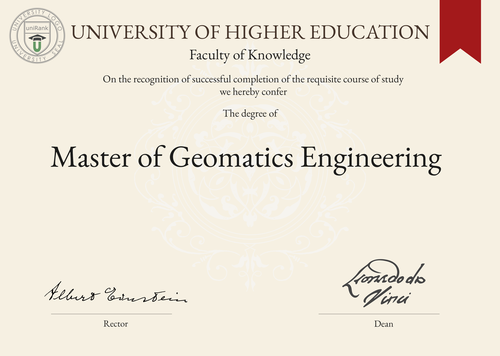
Master of Geomatics Engineering (MGE)
Guide to Master of Geomatics Engineering Program/Course/Degree
Master of Geomatics Engineering (MGE)

Program Name:
Master of Geomatics EngineeringProgram or Degree abbreviation:
MGEDuration range:
The duration of the Master of Geomatics Engineering program can vary depending on the country or university. Typically, it ranges from 1 to 2 years.Tuition range:
The tuition fees for the Master of Geomatics Engineering program can vary based on the country or university. The range can vary from affordable to expensive, depending on the location and reputation of the institution.Overview:
The Master of Geomatics Engineering program is designed to provide students with advanced knowledge and skills in the field of geomatics. Geomatics is a multidisciplinary field that combines surveying, mapping, remote sensing, geographic information systems (GIS) and other related technologies. This program aims to equip students with the necessary expertise to solve complex spatial problems and contribute to various industries such as urban planning, environmental management, transportation and resource exploration.Curriculum Overview by year:
The curriculum of the Master of Geomatics Engineering program is structured to cover both theoretical and practical aspects of geomatics. The specific courses and their order may vary depending on the university. However, a typical curriculum may include the following: Year 1: - Introduction to Geomatics - Geospatial Data Analysis - Surveying and Mapping Techniques - Remote Sensing and Image Analysis - Geographic Information Systems (GIS) - Spatial Data Infrastructure - Geodetic Science - Geomatics Project Management Year 2: - Advanced GIS Applications - Spatial Database Management - Geospatial Algorithms and Modeling - Geomatics for Environmental Management - Geomatics for Urban Planning - Geomatics for Transportation - Geomatics for Resource Exploration - Research Project or ThesisKey Components:
The key components of the Master of Geomatics Engineering program include: 1. Surveying and Mapping Techniques: Students learn about various surveying methods, instruments and techniques used to collect and analyze spatial data. 2. Remote Sensing and Image Analysis: This component focuses on the interpretation and analysis of satellite imagery and aerial photographs to extract valuable information about the Earth's surface. 3. Geographic Information Systems (GIS): Students gain expertise in using GIS software and tools to manage, analyze and visualize spatial data. 4. Spatial Data Infrastructure: This component covers the design, development and implementation of systems that enable the sharing and integration of geospatial data across different organizations and platforms. 5. Geodetic Science: Students learn about the principles and techniques used in geodesy, which involves measuring and modeling the Earth's shape, gravity field and geodynamic processes.Career Prospects:
Graduates of the Master of Geomatics Engineering program have excellent career prospects in various industries and sectors. Some potential career paths include: - Geomatics Engineer - GIS Specialist - Remote Sensing Analyst - Surveyor - Cartographer - Urban Planner - Environmental Consultant - Transportation Planner - Geospatial Data Analyst - Geodetic SurveyorSalary Expectations:
The salary expectations for professionals with a Master of Geomatics Engineering degree can vary depending on factors such as experience, location and industry. Generally, geomatics engineers and related professionals earn competitive salaries. Entry-level positions may have salaries ranging from $50,000 to $70,000 per year, while experienced professionals can earn upwards of $100,000 per year. For a more accurate understanding of salary expectations, you can utilize the Job Sites Search Engine, from our sister site jobRank, which searches over 4,600 job sites worldwide. Make sure to specify not only the job title but also the country you are interested in.Conclusions:
It is important to note that the duration, tuition fees, curriculum, key components, career prospects and salary expectations of the Master of Geomatics Engineering program can vary depending on the chosen country or location of study, as well as the university. Prospective students are advised to research and compare different universities and countries to find the best fit for their academic and career goals. Visitors interested in pursuing a Master of Geomatics Engineering degree can use the uniRank World Universities Search Engine to search for universities offering this specific degree anywhere in the world. This search engine provides comprehensive information about universities, their programs and rankings, helping students make informed decisions about their education.World Universities Search Engine
search for Master of Geomatics Engineering (MGE) and add the Location (country, state etc.) or specific University you are interested in studying at.
Query examples:
- Master of Geomatics Engineering (MGE) United States
- Master of Geomatics Engineering (MGE) United Kingdom online
- Master of Geomatics Engineering (MGE) Australia international students
- Master of Geomatics Engineering (MGE) University of California
- Master of Geomatics Engineering (MGE) University of London tuition fees
- Master of Geomatics Engineering (MGE) University of Sydney scholarships
Share Program/Course
Interesting? Share this program/course/degree info with your friends now.